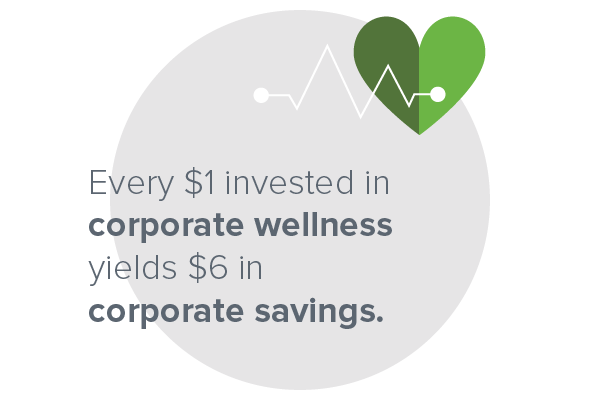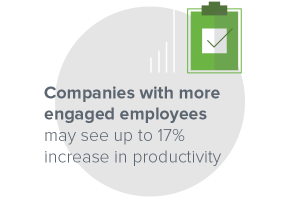The Business Case for Nutrition
Lower Healthcare Costs
Employee wellness programs can help your employees live a healthier lifestyle. Until recently, these programs were seen as a “perk”: something you might offer solely for the employee’s benefit, but with little real business value. As healthcare costs continue to rise, however, organizations are finding that employee health is a real business concern.
The ROI of employee wellness includes lower healthcare costs, increased productivity, and the ability to attract and retain top talent.
But it takes the right kind of program to fully realize the potential business benefits: One with an emphasis on nutrition.
Why Nutrition Matters for Employee Wellness
Three of the biggest chronic health conditions in America are directly related to nutrition: obesity, cardiovascular disease, and diabetes. People make an average of 200 food decisions every day. Each of these decisions is an opportunity to promote wellness and avoid chronic disease—or do the opposite.
An employee wellness program that includes nutrition and lifestyle support is not only good for employees—it makes good business sense. Explore this guide to learn how employee wellness and corporate nutrition programs can lower costs, boost productivity, and help your organization recruit and retain top talent.
Nutrition is Key to Reining in Employer Health Costs
Obviously, a program that helps employees stay healthy can help lower healthcare costs. But when wellness includes employee nutrition, the savings become more substantial.
A nutrition-based program can help employees avoid and/or manage chronic illness. Eighty-six percent of healthcare costs are attributable to patients with at least one chronic illness, and patients with chronic diseases account for 76% of all physician visits and 91% of all prescriptions filled. Many of these chronic illnesses are nutrition-related, including diabetes, obesity, and cardiovascular issues.

As healthcare costs continue to rise, many organizations face a tough choice. Either they can take an ever larger hit to the bottom line, or pass the costs on to employees. The latter option makes sense in the short run, but can make your organization less attractive to the kind of talent you need to maintain and grow the business. Investing in a wellness program that reduces costs can help your organization out of the Catch-22.
One study found that every $1 invested in employee wellness yielded $6 in healthcare savings. That kind of return on investment would be impressive for any business decision. Add in the positive benefits to your employees, and it practically becomes a no-brainer.
But there’s more to the ROI of corporate wellness than lower healthcare costs. Healthier employees lead to a healthier bottom line in specific, measurable ways.
Reclaimed & Increased Productivity
 The business benefits of healthy employees fall into two broad categories: productivity and employee engagement.
The business benefits of healthy employees fall into two broad categories: productivity and employee engagement.
The productivity benefits are the more obvious of the two. First, healthier employees take fewer sick days. But time out of work affects productivity beyond just the hours missed. There’s the time spent getting back up to speed after an absence, and the extra work generated for those still in the office. Not to mention the employees who will choose to come to work sick and spread their germs throughout the office.
The second category, employee engagement, is top-of-mind for most organizations because it can make a substantial difference in your corporate culture. A comprehensive employee wellness program makes employees feel valued. They’re not just cogs in a machine; their employer cares about their well-being and is actively helping them lead a healthier lifestyle.
That sense of connection and purpose may seem intangible, but it can have a significant impact on the business. Companies with more engaged employees may see up to a 41% reduction in absenteeism and a 17% increase in productivity. These gains translate directly to business results: Gallup reports that businesses with engaged employees saw a 10% increase in customer ratings, a 20% increase in sales, and 21% greater profitability than organizations with a less motivated workforce.
Simply put, employee wellness programs are part of a healthy corporate culture, especially holistic programs that include an emphasis on nutrition. That healthy corporate culture is good for your existing employees, and also for attracting the next wave of talent.
A Corporate Culture that Attracts & Retains Top Talent
 When it comes to recruiting efforts, your employees are your reputation. Potential recruits will look to your existing employees as the most trusted source of information about what working for your organization is really like.
When it comes to recruiting efforts, your employees are your reputation. Potential recruits will look to your existing employees as the most trusted source of information about what working for your organization is really like.
Employee influence extends far beyond just people who are actively evaluating your company, too. Employees have, on average, 10 times the social media reach of your corporate accounts. Your next office superstars could be in your existing employees’ social media sphere—what are they hearing about your company?
When your corporate culture promotes health and employee wellness, your company is more attractive to the top talent that can afford to be choosy about where they work. Companies that regularly top “Best Places to Work” lists—from Facebook to Google to Zappos—tend to offer corporate wellness programs and employee nutrition benefits. At these workplaces, the food benefits go beyond providing free soda and snacks—there’s an emphasis on empowering employees to make healthy choices.
Simply put, people want to work for an organization with an employee-centric culture, and caring about employee health is a sizable part of the equation.
Why Employee Nutrition is a Vital Part of Employee Wellness
Historically, most employee wellness programs have focused on increasing employees’ physical activity. From gym membership discounts to in-house yoga classes, there’s a definite emphasis on exercise.
While exercise is a vital part of overall health and well-being, research shows that nutrition plays a far greater role. A study from the National Institute of Health reviewed weight management programs that combined exercise and diet, versus plans focused on diet alone. The study found that diet plus exercise performed slightly better than diet alone, but that diet appeared to be the key factor in sustainable weight loss.
But it’s not just about losing weight. A study in the Journal of the American Medical Association found that diet was the number one factor impacting health status:
Given the data, it’s easy to see why many employee wellness programs fail to generate long-lasting results. Even though dietary risks are the leading factor in affecting health status, most wellness programs fail to emphasize nutrition. Your employees are challenged to make smart food choices every day, in a world full of quick, easy, unhealthy food. It’s vital to address employee nutrition for your program to make a measurable, sustainable difference.
The Challenges of Healthy Eating: What You're Up Against
The modern food landscape is specifically engineered to promote calorie-dense food full of salt, sugar and fat. From fast food to restaurants to the impulse buys at the supermarket checkout, it’s never been easier to fill up on unhealthy food. These food options are not only unhealthy, they’re addictive.
Our latest white paper, Today’s Food Landscape Is Trashing Your Employee’s Health (But You Can Fix That) explains in detail how the marketing of unhealthy food stacks the deck against the consumer. Then we take an in-depth look at how we can engineer an environment that makes eating healthy just as cheap, easy, and delicious as the alternative.
Fill out the form below to get your copy:
How to Create a Profitable Employee Wellness & Nutrition Program
The right wellness program offers a host of potential benefits to your employees and your business alike. To fully realize that potential, though, it’s vital to create a program that promotes effective, sustainable change. Here are the four characteristics of the most effective programs:
Corporate wellness with an emphasis on employee nutrition can make a major difference to your organization’s bottom line. A well-run program can keep your existing employees healthy and motivated, and serve as a beacon for the next wave of talent, too.
